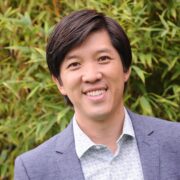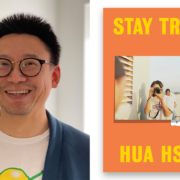Jan. 22, 2020
IRVINE, Calif. — Charles Yu is very interested in stories, both the stories we tell ourselves and the stories that are told to us, so let’s start with a story about him.
Once upon a time, there was a boy born in Los Angeles to a Taiwanese mother and father. The boy spent his days watching “The Twilight Zone” reruns, playing Street Fighter II, reading “Choose Your Own Adventure” books and thinking about where he might fit in. When he grew up, he became a corporate lawyer.
The end.
Except, as with all good stories, there’s more to the story than that.
The boy also wrote fiction, but not until he was an adult. He worked as a lawyer by day and wrote late into the night. He published three books, and his fourth, the novel “Interior Chinatown,” is set to come out at the end of this month.
It’s the story of Willis Wu, a young man who’s struggling to figure out what his role is in life, literally. Wu resides in a version of Chinatown that’s both a real place and the backdrop to an ongoing police procedural TV show called “Black and White.” Its inhabitants live their lives as well as the parts assigned to them: Disgraced Son, Delivery Guy, Young Dragon Lady, Silent Henchman or the most coveted role of all, Kung Fu Guy. “Interior Chinatown” — the title puns on the screenplay convention for describing locations — recalls the humorous and heartfelt short stories of George Saunders, the metafictional high jinks of Mark Leyner and films like “The Truman Show.”
“I feel like I was an existentialist from the age of 5,” Yu, 44, said last month over dim sum near his home in Irvine. He’d suggested we meet at this restaurant in the Spectrum Center, a sprawling, pleasantly engineered outdoor mall that functions as Irvine’s de facto civic space. It’s the kind of place that, frankly, might serve as a setting for one of Yu’s stories, which are often about the uneasy feeling that something’s not quite right with the world. “Even as a kid,” he said, “I was always obsessed with these questions. Who am I? How did I get here? What am I doing in this place?”
Despite these inclinations, he never believed he would be a writer. Instead, he went to law school at Columbia. It was there, while studying for the bar, that he picked up books of fiction that blew his mind: Saunders, A.M. Homes, Donald Barthelme — writers who grappled with those same questions in bracing ways.
So Yu started writing short stories of his own. He sent them out to literary journals. “I got hundreds of rejections,” he said. “I started posting them on a wall. But one in 50 stories would get published.” The stories were examinations of anxiety and heartbreak, usually framed by a high-concept conceit, such as the travails of a sad-sack superhero named Moisture Man. An agent read one and contacted him. Together they sold his first collection, “Third Class Superhero,” which was published in 2006.
The book was well-reviewed and sold decently. Still, in Yu’s mind, he wasn’t really a writer. He was a lawyer. “Not having an M.F.A., having a day job, there was always a feeling like I came in through the back door, or at least the side door,” he said. “Even to this day, it all feels a bit D.I.Y. It’s like I don’t play an instrument, I play a shoebox guitar I made in my garage.”
This is where Yu’s story takes an improbable twist. His collection fell into the hands of the novelist Richard Powers, who championed Yu to be named one of the National Book Foundation’s Five Under 35 most promising writers in America in 2007. Yu was flabbergasted. He’d never met Powers.
The encouragement was enough to spur him to finish his first novel, “How to Live Safely in a Science Fictional Universe,” about a time-machine repairman who’s willfully stranded himself between moments in time, even as he searches for the father who disappeared from his life. That book also did well, critically and financially, so he followed up in 2012 with the short-story collection “Sorry Please Thank You,” which was not quite as successful, either critically or financially. He still owed his publisher another book but Yu recalls feeling self-doubt once again, thinking, O.K., that was fun, but maybe this is it.
Then he got a call from HBO.
Here, the story goes from slightly improbable to downright implausible. Yu had had enough interest from TV executives in his earlier books that he’d done a “water bottle tour” — meeting with studios to talk vaguely about potential projects — but he had never considered himself a TV writer. One executive he’d met, though, disagreed. David Levine, who at the time was the co-head of drama at HBO (he’s since left to join Anonymous Content), orchestrated a meeting between Yu and Jonathan Nolan and Lisa Joy, the showrunners developing “Westworld.” “He was so self-deprecating,” Levine recalled. “He told me, I have this other life, I’m never really going to be a writer, this was always a side career. Writing was still a middle-of-the-night business for him. I just said, Why don’t you do it full-time?

Yu quit his job as a lawyer and started writing for “Westworld.” From there he went from one TV job to the next, eventually landing at “Lodge 49,” the sweet and surreal drama on AMC created by the fellow novelist Jim Gavin. “Here was this incredibly smart guy who could really be doing anything he wanted,” Gavin said. “What I could sense in his fiction is this strain of comic humanism that underlies the larger conceptual frameworks — that notion that his characters exist in an absurd universe.”
TV writing kept Yu so busy, in fact, that it became another day job. He had two children by then, his novel had stalled, and he was feeling overwhelmed. In 2017, he told his wife he’d decided to abandon the novel and quit writing fiction. She heard him out, then encouraged him to get back to work. After many delays and false starts, he finished “Interior Chinatown,” a book focused, not coincidentally, on the mythmaking machinery of Hollywood. “I was walking one day and the first line came to me: ‘Ever since you were a boy, you’ve dreamt of being Kung Fu Guy,’” he said. “As a kid, in pop culture, there was really only one truly cool Asian-American stereotype, which is, ‘You might know kung fu!’ There was Bruce Lee. There was Jackie Chan. That’s it.”
Yu started thinking about the immigrant experience of his parents, the experience of his children, his own experiences, and who gets to be the star of his or her own story, rather than a supporting character in someone else’s. “The elevator pitch for the book became, ‘You know that “Law & Order” episode we’ve all seen that’s set in Chinatown?’” Yu said. “I want to know about the life of that guy in the background — the one who’s unloading the van and who got one line.”
It’s been nearly 15 years since the National Book Foundation anointed Yu as one of the best young writers in America, yet for the first time, he’s starting to believe he’s a writer. Maybe he’s not an impostor after all. “If anything, it’s feeling confident that if I say the thing I’m trying to say in the way that I know how to say it, that will be interesting to at least some people,” Yu said. “It’s nice when you feel like you kind of know what you’re doing, a little bit.”
After dim sum, we head out to stroll the manicured laneways of the Spectrum Center. We joke that the mall, with its cheerful storefronts and town square built around a Ferris wheel, feels like the Matrix, or “The Good Place” from TV — an artfully rendered simulacrum of happiness. But maybe it’s O.K. to find your Good Place.
“You know what else is a simulacrum?” Yu said. “A dream! And this” — he looks around — “feels like a dream.”
*A version of this article appears in print on Jan. 24, 2020, Section C, Page 15 of the New York edition with the headline: A Book’s Satisfying Conclusion.
Source from The New York Times
Posted in 10/2020






